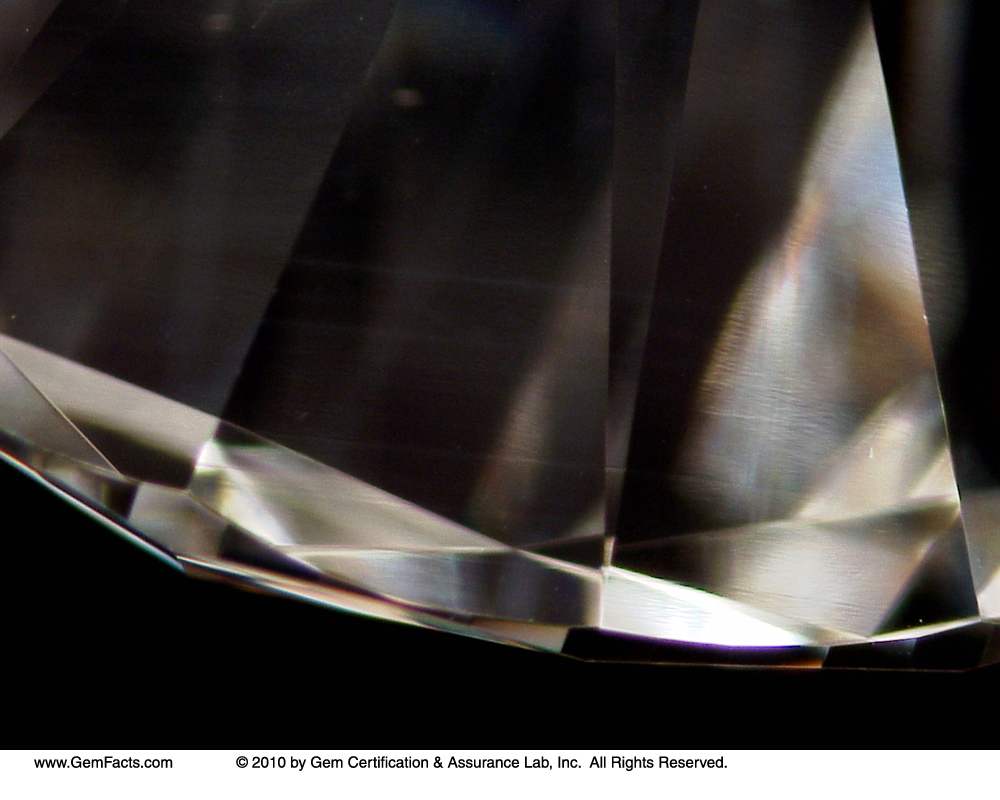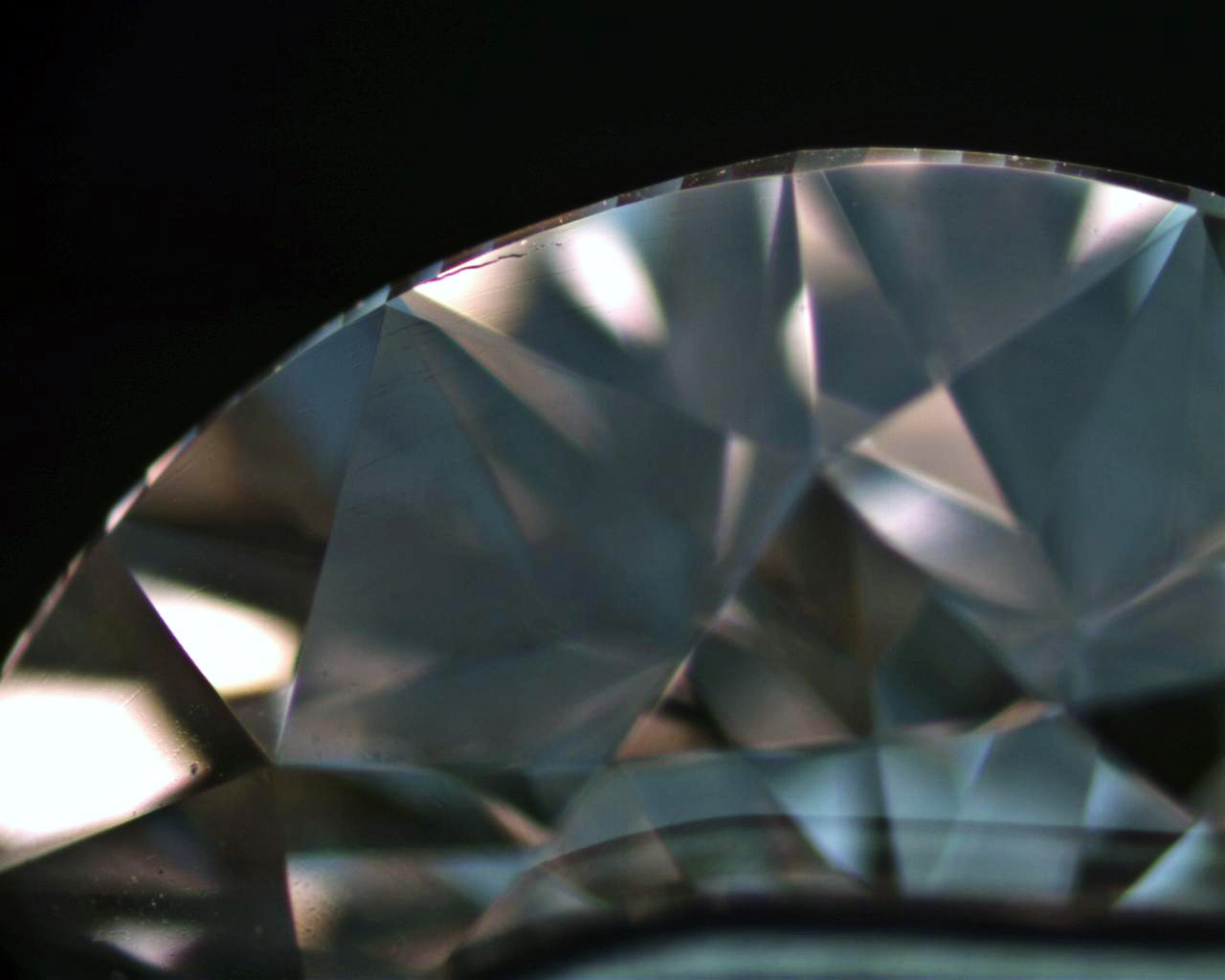Photomicrograph Gallery
Whitish graining only visible through pavilion.

Brown reflective grain lines only visible through the pavilion.
.jpg)
Laser groove on the upper girdle facet is a remnant of the cutting process

Small feather on the pavilion main junction viewed through the bezel facet (located at approx. 4 o'clock)
.jpg)
Close-up of previous image. (Small feather on the pavilion main junction viewed through the bezel facet)
.jpg)
Two small crystals located under the star facet (located at approx. 3 o'clock)
.jpg)
Two small crystals located under the table
.jpg)
Two small clouds located under the table
.jpg)
Small feather on the table facet
.jpg)
Two bright small crystals located in the center of the table. Low VS1
.jpg)
Bright feather located on pavilion and visible through upper girdle facet. Low VS1
.jpg)
Crystal and small cloud located under table. The crystal is too bright to be VS1
.jpg)
Cloud located under the table facet.
.jpg)
Clouds located under the table facet.
.jpg)
Crystal located under the table facet and feather located on the upper girdle facet.
.jpg)
Needle visible through the bezel facet.
.jpg)
Wispy cloud with crystal located on the bezel facet and three small crystals located under the table facet.
.jpg)
Close-up of previous image. (Wispy cloud with crystal)
.jpg)
VS2 size chips on the girdle of an old diamond.
.jpg)
Cloud located in the center of the diamond is only visible with strong fiber optic illumination. Low VS2
.jpg)
A bright shallow feather cuts through the bezel and upper girdle facets and crystals located under the table and upper girdle facets.
.jpg)
Close-up of previous image. (A bright shallow feather)
.jpg)
Cloud visible through upper girdle and bezel facets. If this same cloud were located in the center of the diamond than the grade would be SI1.
.jpg)
Dark cloud located under the edge of the table. Low VS2.
.jpg)
Cloud located in the center of the diamond.
.jpg)
A dense cloud located under the bezel and star facet junction.
.jpg)
Two feathers extending from the table facet through the bezel and star facets.
.jpg)
Crystals and feather located on the table facet.
.jpg)
Feather on the crown and one feather on pavilion viewed through table, star and bezel facets.
.jpg)
Reflecting black crystal and clouds located under the table facet.
.jpg)
A crystal located under the table reflects around the crown.
.jpg)
Crystal with feather located at the edge of the table facet.
.jpg)
Clouds/twinning wisps located under the table and star facets. Low SI1.
.jpg)
Medium size crystal located under the edge of the table facet. Low SI1.
.jpg)
A dense cloud throughout the center is visible with strong fiber optic illumination, but is difficult to see under standard darkfield lighting. Low SI1.
.jpg)
White feather located on table facet.
.jpg)
Medium to large transparent crystals located in center of the table.
.jpg)
Dark crystals located on the edge of the table facet.
.jpg)
Feather on pavilion reflects and is visible through table, star and bezel facets.
.jpg)
Inclusions and reflections throughout crown
.jpg)
Feather cutting through bezel and star facets and crystal/clouds under the table
.jpg)
Cloud under center of table and white feather through bezel and upper girdle facet
.jpg)
Dark cloud visible through bezel and upper girdle facets and crystal under center of table. Low SI2
.jpg)
Feather through upper girdle and bezel facets and twinning wisps throughout the crown. Low SI2
.jpg)
Twinning wisps throughout the crown. Low SI2
.jpg)
Crystals, clouds and twinning wisps throughout crown
.jpg)
Dark dense cloud in center and crystal with reflections under edge of table. Low SI2.
.jpg)
Black crystal with reflections. Low SI2.
.jpg)
Dark cloud with feather under the edge of table. Low SI2.
.jpg)
Black crystal with reflections.
.jpg)
White crystal on edge of table and black crystal with reflections.
.jpg)
Bright deep feather extending from crown to pavilion (approx at 11 o'clock).
.jpg)
Bright and heavy twinning wisps in the center of the diamond.
.jpg)
Numerous feathers and dense cloud.
.jpg)
Bright, deep feather from star to bezel facet.
.jpg)
Bright crystal located under star and bezel facets, and additional inclusions throughtout.
.jpg)
Bright, deep feather extending from table through star facet.
.jpg)
Large crystal with feather in the center of the table facet.
.jpg)
Deep, transparent feathers.
.jpg)
Knot located on edge of table and stat facet, and crystals throughout.
.jpg)
Very deep, transparent feather across table facet
.jpg)
Very deep feather.
.jpg)
Very deep feather and dark cloud throughout.
.jpg)
Large, bright, crystal with feather.
.jpg)
Very deep feather located on the pavilion.
.jpg)
White feather extending from girdle to upper girdle facets. VS2 feather.
.jpg)
Feather across pavilion facets of a princess cut diamond. The reflection of the feather creates the appearance of an actual feather. High SI2 feather.
.jpg)
Numerous transparent rounded crystals in a cushion cut diamond. SI2.
.jpg)
A knot is a surface reaching transparent crystal. In this diamond the knot extends across the lower girdle facets and part of the girdle.
.jpg)
Whitish lines extending from the center of this diamond are known as twinning wisps. These are caused by disturbances during the crystal's growth.
.jpg)
The extremely thin girdle of the diamond is susceptible to chipping.
.jpg)
Surface graining running across the pavilion facets of this cushion cut are visible through the table.
.jpg)
Reflective graining is visible through the lower girdle facet. It looks like transparent sheets extending into the diamond.
.jpg)
When viewed in diffuse white light, brown graining is visible through the pavilion of this diamond.
.jpg)
When viewed in reflected light, drag lines extending from small surface reaching inclusions are visible on the table facet of this diamond.
.jpg)
Polish lines on one of the pavilion facets are visible when viewed through the table.
.jpg)
One pavilion facet shows 'orange peel' burn marks resulting from the polishing process.
.jpg)
One pavilion facet shows 'soap scum' burn marks resulting from the polishing process.
.jpg)





